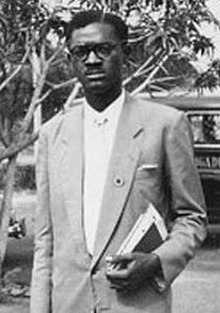BLACK SOCIAL HISTORY
| Patrice Lumumba | |
|---|---|
 |
|
| 1st Prime Minister of the Democratic Republic of the Congo | |
| In office 24 June 1960 – 14 September 1960 |
|
|
||
In late October 1959, Lumumba, as leader of the MNC, was arrested for allegedly inciting an anti-colonial riot in Stanleyville where thirty people were killed; he was sentenced to six months in prison. The trial's start date of 18 January 1960, was also the first day of a round-table conference in Brussels to finalize the future of the Congo. Despite Lumumba's imprisonment at the time, the MNC won a convincing majority in the December local elections in the Congo. As a result of strong pressure from delegates upset with Lumumba's trial, he was released and allowed to attend the Brussels conference. The conference culminated on 27 January with a declaration of Congolese independence, setting 30 June 1960, as the independence date with national elections from 11–25 May 1960. Lumumba and the MNC won this election and the right to form a government, with the announcement on 23 June 1960 of 34-year-old Lumumba as Congo's first prime minister and Joseph Kasa-Vubu as its president. In accordance with the constitution, on 24 June the new government passed a vote of confidence and was ratified by the Congolese Chamber and Senate.
Independence Day was celebrated on 30 June in a ceremony attended by many dignitaries including King Baudouin and the foreign press. Lumumba delivered his famous independence speech after being officially excluded from the event programme, despite being the new prime minister. The speech of Belgian King Baudouin praised developments under colonialism, his reference to the "genius" of his great-granduncle Léopold II of Belgium glossing over atrocities committed during the Congo Free State. The King continued, "Don't compromise the future with hasty reforms, and don't replace the structures that Belgium hands over to you until you are sure you can do better... Don't be afraid to come to us. We will remain by your side, give you advice." Lumumba responded by reminding the audience that the independence of the Congo was not granted magnanimously by Belgium:
For this independence of the Congo, even as it is celebrated today with Belgium, a friendly country with whom we deal as equal to equal, no Congolese worthy of the name will ever be able to forget that it was by fighting that it has been won, a day-to-day fight, an ardent and idealistic fight, a fight in which we were spared neither privation nor suffering, and for which we gave our strength and our blood. We are proud of this struggle, of tears, of fire, and of blood, to the depths of our being, for it was a noble and just struggle, and indispensable to put an end to the humiliating slavery which was imposed upon us by force.In contrast to the relatively harmless speech of President Kasa-Vubu, Lumumba's reference to the suffering of the Congolese under Belgian colonialism stirred the crowd while simultaneously humiliating and alienating the King and his entourage. Some media claimed at the time that he ended his speech by ad-libbing, Nous ne sommes plus vos macaques! (We are no longer your monkeys!)—referring to a common slur used against Africans by Belgians, however, these words are neither in his written text nor in radio tapes of his speech. Lumumba was later harshly criticised for what many in the Western world—but virtually none in Africa—described as the inappropriate nature of his speech.
The province of Katanga declared independence under regional premier Moïse Tshombe on 11 July 1960 with support from the Belgian government and mining companies such as Union Minière. Despite the arrival of UN troops, unrest continued. Since the United Nations refused to help suppress the rebellion in Katanga, Lumumba sought Soviet aid in the form of arms, food, medical supplies, trucks, and planes to help move troops to Katanga. Lumumba's decisive actions alarmed his colleagues and President Joseph Kasa-Vubu, who preferred a more moderate political approach.
Assassination - BLACK SOCIAL HISTORY
| “ | Dead, living, free, or in prison on the orders of the colonialists, it is not I who counts. It is the Congo, it is our people for whom independence has been transformed into a cage where we are regarded from the outside… History will one day have its say, but it will not be the history that Brussels, Paris, Washington, or the United Nations will teach, but that which they will teach in the countries emancipated from colonialism and its puppets... a history of glory and dignity. | ” |
















































No comments:
Post a Comment